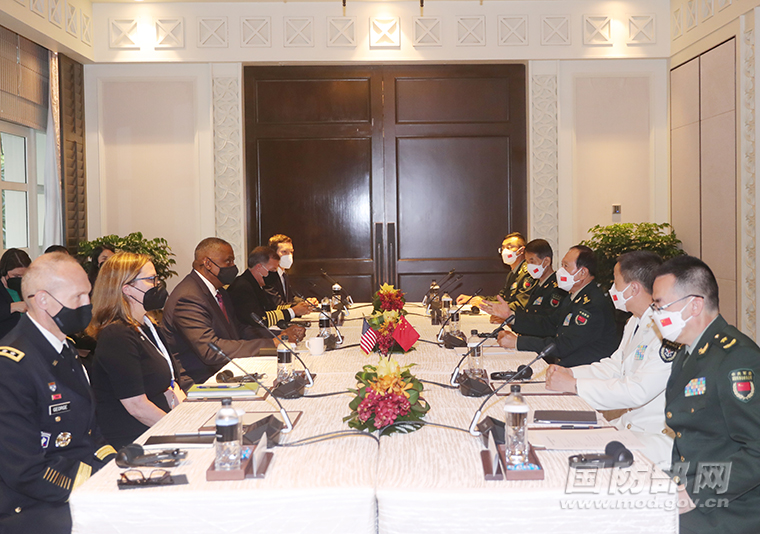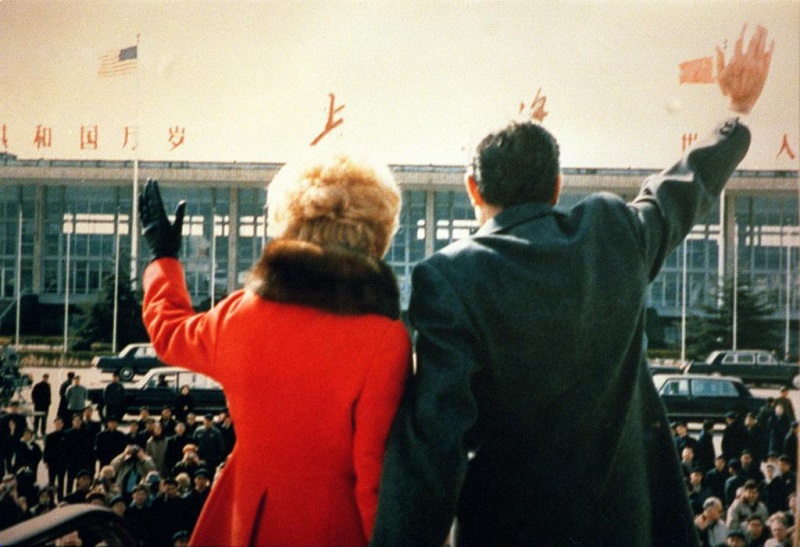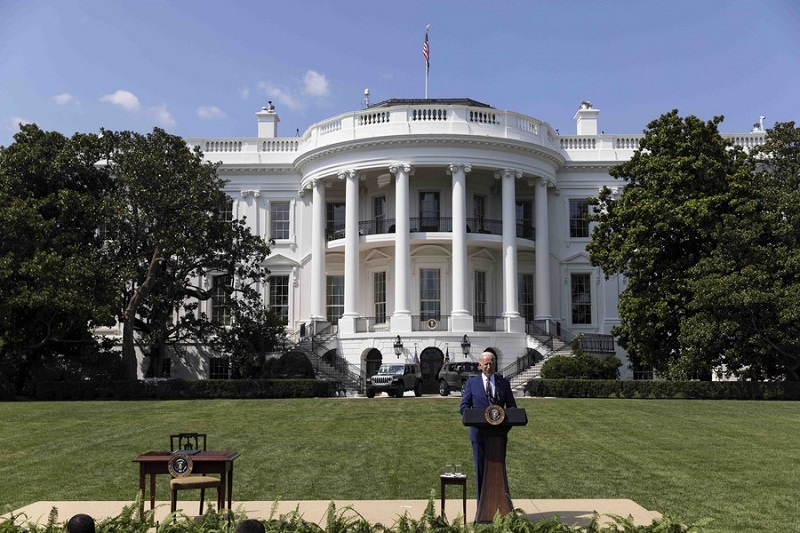The relationship between China and the U.S. has been built on cooperation, trade, and most importantly the agreement of the sacrosanct “one-China” principle. But it is seen that the U.S. government throughout different presidencies has been provoking China by violating the one-China principle, selling weapons to China’s Taiwan region, emboldening the “Taiwan independence” separatist forces and disrupting the peace and stability across the Taiwan Strait.
The U.S. Defense Security Cooperation Agency (DCSA) recently announced a $120 million arms sale package for “naval ship spare parts and related technical support” to Taiwan authorities. It is the fourth arms package to the island since U.S. President Joe Biden took office in January 2021 and the third one in this year.
The U.S. selling weapons to Taiwan is a repetition of the same old problem in the Sino-U.S. relationship, which flares up every once in a while. Over the years, arms sales to Taiwan have been the strongest destructive power in Sino-U.S. ties, and have severely poisoned the military exchanges between the two sides. Since 2019, the Trump and Biden administrations each sold over $14.2 billion worth of military equipment to Taiwan violating the one-China principle and the three China-U.S. joint communiques. It is high time for such violations to come to an end, to the benefit of both China and the United States.
There’s no doubt that the latest arms sale is not only dangerous but also an idiotic move on the part of President Biden for its corrosive effect on the Sino-U.S. ties, for it sends “a wrong signal” to those promoting separatist activities favoring “Taiwan independence” and will do great harm to peace and stability across the Strait. The arms sales to Taiwan provoked a strong protest from China. Foreign Ministry spokesman Zhao Lijian reiterated that the U.S. side should abide by the one-China principle and the provisions of the three joint communiqués, urging it to revoke the sales and stop military ties with the Taiwan region.

On the other hand, during a meeting with U.S. Secretary of Defense Lloyd Austin on the sidelines of the 19th Shangri-La Dialogue security summit in Singapore on June 10, China’s State Councilor and Minister of National Defense General Wei Fenghe gave a sternest warning, “We will resolutely crush any attempt to pursue ‘Taiwan independence’. If anyone dares to separate Taiwan from China we will not hesitate to fight. We will fight at all costs. We will fight to the very end. No one should ever underestimate the resolve and capabilities of the Chinese armed forces to defend its sovereignty and territorial integrity.”
Surely, this is a powerful rebuke to the U.S. efforts to interfering in China’s reunification cause by groupings – such as AUKUS and the Quad – which are aimed to contain China and reflected a cold-war mentality. If President Biden wantonly sells weapons to Taiwan, violating the “one-China” principle, China would have little encouragement to partner with the U.S. government on international issues considered of vital importance in Washington.
Biden must remember that the island of Taiwan is just as much an inalienable part of China as Long Island has been to New York and the United States. The government of the People’s Republic of China is the sole legal government of China, a fact recognized by the United Nations following the Resolution 2758 passed on October 25, 1971 and over 180 countries including the United States. Therefore, once Biden is president, he needs to learn the basics of one -China principle that underpins China-U.S. relations.
The three China-U.S. joint communiques marked the advent of friendly ties between the two countries. The first joint communiqué, also known as the Shanghai communiqué, was issued on February 28, 1972. Then-U.S. President Richard Nixon visited China and the Shanghai Communiqué was issued. The official text of the communiqué regarding the one-China principle states: “The U.S. acknowledged that there is only one China and that Taiwan is a part of China. Both sides agreed to respect each other’s national sovereignty and territorial integrity. And the two nations agreed to take action against ‘any country’ establishing ‘hegemony’ in the Asia-Pacific.”

Then-U.S. President Gerald Ford’s visit to China in December 1975 paved the way for the second joint communiqué which was issued on December 16, 1978 during the Jimmy Carter Presidency. On January 1, 1979, the United States officially established diplomatic relations with China, confirming it would sever its “diplomatic relations” with Taiwan, withdraw its military forces there, and terminate the Mutual Defense Treaty. The U.S. again acknowledged the Chinese position that there is only one China and Taiwan is part of China. This meant formal recognition of the one-China Principle.
The third joint communiqué, known as the August 17 Communique, was issued on August 17, 1982 during the Reagan Presidency. This joint communiqué reaffirmed commitments made within the previous two communiqués, bolstering the commitment to honor the one-China Principle while declaring the U.S. intent to gradually decrease its sale of arms to Taiwan.
Thus, it is historically proved that the one-China principle is something the United States adopted and has upheld for itself, though U.S. government calls it “one-China policy”. China did not impose it. On the one hand, the U.S. government says it honors the “one-China policy”, while continuing to use the so-called Taiwan Relations Act (TRA) of 1979 signed by President Jimmy Carter and the “Six Assurances” made in 1982 by President Ronald Reagan to justify “defensive” arms sales. The “Taiwan Relations Act” and “Six Assurances” are now completely “illegal and invalid.”
The Sino-U.S. relationship has turned sour fundamentally since the former U.S. President Donald Trump’s regime. He disregarded diplomatic convention with China in favor of giving diplomatically isolated Taiwan authorities a friendly nod. Trump’s endorsement of the Taiwan Travel Act (TTA) into law on March 16, 2018 that encourages the U.S. to send officials “of all levels” to Taiwan to meet their “counterparts” on the island, and vice versa was the best example of his treachery to his given promise to President Xi Jinping during his first telephone call on February 9, 2017 in which he agreed to honor “one-China policy” which proclaims Taiwan is an inalienable part of China’s territory.
Following the footsteps of former presidents, President Biden with world domination in mind has been making frequent comments on the Taiwan question recently. On August 19, 2021, Biden, in an interview aired by ABC News, appeared to lump Taiwan together with countries with which the U.S. has explicit defense commitments, such as South Korea, suggesting a deviation from the position of “strategic ambiguity” on Taiwan. He said that he would be willing to use force to defend Taiwan from attack by China while meeting with Japanese Prime Minister Fumio Kishida on May 23, 2022. Making such type of witless provocative comments about China, he has also seriously damaged the Sino-U.S. ties with little to show for it.

What’s more, a number of lawmakers of U.S. congress had paid a visit to Taipei over the past half year. It is seen that by passing several bills including the Taiwan Allies International Protection and Enhancement Initiative (TAIPEI) Act, Taiwan Travel Act as well as launching the “U.S.-Taiwan Initiative on 21st-Century Trade”, the U.S government has been playing the Taiwan card.
If the Biden administration is determined to play the Taiwan game, China will have no choice but to take off the gloves. China and the United States could end up in a military conflict if the U.S. encourages “Taiwan independence”.
The secessionists in Taiwan island should recognize it is a delusion that the U.S. will spill blood coming to the independence of Taiwan. Biden and past U.S. presidents are using Taiwan as “bargaining chip” to get other things from China. Ultimately, the Taiwanese authorities may well regret being a pawn of the current U.S. president and his radical policies. Tsai Ing-wen and her deluded DPP followers in the island had better wake up, acknowledge their mistakes, and face the reality of the 1992 Consensus on cross-Strait relations. There is no other alternative.
Instead of continuing to prick China, Biden and his advisors should not lead Taiwanese secessionists a merry dance in their misguided attempts to achieve their impossible aim of pursuing the island’s “independence”.
China has said on many occasions in clearer terms that Taiwan is a matter of reunification left over from history and is thus an internal affair that brooks no interference from outside. Biden has revived former U.S. President Barack Obama’s “pivot” or strategy of rebalancing Asia to contain China’s growing influence; however, the most urgent rebalancing act is to stop selling weapons to Taiwan and to stop overt and covert official contacts with Taiwan as in the interests of Asia-Pacific peace and even that of the world at large.